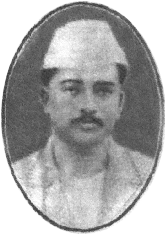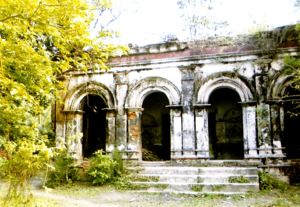A.K. Golam Jilani facts for kids
Quick facts for kids
A. K. Golam Jilani
|
|
|---|---|
 |
|
| Born | 24 October 1904 |
| Died | 9 February 1932 (aged 27) |
| Resting place | Algichor, Nawabganj Upazila, Dhaka, Bangladesh |
| Political party | All Bengal Khilafat Committee All India Congress Committee (AICC) |
A. K. Golam Jilani (born October 24, 1904 – died February 9, 1932) was a brave Bengali freedom fighter. He worked to make India independent from British rule. He was from Nawabganj Upazila, Dhaka, which is now part of Bangladesh.
Early Life and Education
A. K. Golam Jilani was born on October 24, 1904. His birthplace was Algichor village in the Nawabganj area of Dhaka. This was in British India, which today includes India, Pakistan, and Bangladesh.
His father, Golam Muhammad Chowdhury, was also a revolutionary. He fought against the British government. Golam Jilani went to the National School and finished his matriculation there. Later, he studied in Patna, the capital city of Bihar, and earned his B.A. degree.
Fighting for Freedom
Golam Jilani became involved in the fight for India's independence. He joined revolutionary groups while he was still a student. He wanted to free India from Great Britain's control.
By the age of 27, he became a secretary. He worked for both the All India Congress Committee (AICC) and the All Bengal Khilafat Committee. He strongly believed that India should be free. Because of his strong anti-British feelings, he even refused a job as a Deputy Magistrate for the British government.
In Galimpur village, Golam Jilani and another leader, Asab Ali Beg, held a meeting. They asked people to join the fight against British rule. Many important leaders visited Algichor to meet Golam Jilani. These included Satish Chandra Dasgupta, Prafulla Chandra Ghosh, Indra Narayan Dasgupta, and even Mahatma Gandhi. They came despite rules from the British government.
Arrest and Sacrifice
In 1932, Golam Jilani gave a powerful speech in Nawabganj. He spoke against the British government. The police arrested him right there at the meeting.
First, Jilani was taken to Algichor to see his mother one last time. Then, he was taken to Dhaka Central Jail. He was kept in a dark, cold cell. He became weaker each day and got typhoid fever.
The British government offered his father a deal. They said Jilani would be released if he stopped fighting them. But Jilani's father, who was also a freedom fighter, refused. He said Jilani would rather die as a hero in jail than work with the British.
In jail, Jilani was treated very harshly, even though he was sick. On February 9, 1932, he passed away in Dhaka Central Jail. His body was brought back to his home village in Algichor. He was buried next to his house. He left behind his 18-year-old wife, Rowshan Ara, and their two young children. His wife passed away in 1991 at the age of 77.
Special Recognition
In 1973, the government of India honored Golam Jilani. He was given the Indian Independence Medal after his death. This award recognized his important role in India's freedom struggle.


